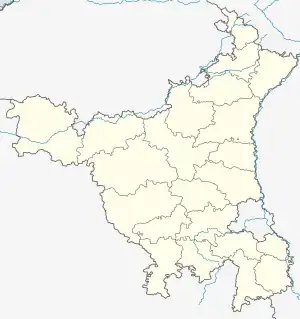Kheri Jalab
Kheri Jalab is a village and an Indus Valley civilization site, located in Hisar District of the state of Haryana in India.
Kheri Jalab | |
|---|---|
Village | |
 Kheri Jalab Kheri Jalab in Haryana, India  Kheri Jalab Kheri Jalab (India) | |
| Coordinates: 29°20′27″N 76°50′13″E | |
| Country | |
| State | Haryana |
| District | Hisar |
| Founded by | Indus Valley civilization |
| Government | |
| • Type | Local government |
| • Body | Panchayat |
| Languages | |
| • Official | Hindi |
| Time zone | UTC+5:30 (IST) |
| Vehicle registration | HR |
| Website | haryana |
Demography
The village is home to people of Sheoran Boora, Punia, Kadian, Khatkar, Bhardwaj and some other sub castes of Jat community. The most dominating caste is Jat though some other castes also live in the village. The jat community has a lot of influence over the village.
Baba Sandokh Nath
The whole village are devotees of Baba but there are about 150 to 200 people and children of the village who always attend the evening aarti of Baba Sandhokh Nath, a local guru of the village.[1] The Baba Sandokh Nath is worshipped by many nearby villages and other villages in Haryana. The ladies of the village gather at the local temple and do satsang and pray for the well-being of the village. The people proform the aarti in the evening time.
Indus Valley Civilization Site
Kheri Jalab is an early-Harappan Indus Valley civilization site.
Bolstering the status of Rakhigarhi as the largest Indus Valley civilization metropolis on the banks of Drishadvati river (current day paleochannel of Chautang), at least 23 other Indus Valley Civilization sites within 5 km (at 4 sites), 10 km (at least 10 sites) and 15 km (at least 9 sites) radius of Rakhigarhi have been discovered till 2001. Some of the raw materials were procured from the nodal Rakhigarhi site and finished products were brought back to the nodal Rakhigarhi site for marketing.[4]
Within 5 km radius are early Harappan (4600 BCE – 2800 BCE) site of Gamra and mature Harappan (2600 BCE – 1400 BCE) sites of Budana, Haibatpur and Lohari Ragho 3.[4]
Within 5 km to 10 km radius, early Harappan sites are Lohari Ragho 1, Lohari Ragho 2 and Kheri Lochab-Kheri Jalab. Mature Harappan small farmstead sites are Milakpur and Gunkali. Small farmstead sites of Kinnar, Nara and Mirchpur have material from both mature and late Harappan period. late Harappan (after 1400 BCE) sites are Sotha and Gandaswala Khera.[4]
Within 5 km to 10 km radius are early, mature and late Harrpan sites. To the north-west of Rakhigarhi are Panhari, Gyanpura, Sotha, Kagsar, Sulchani and south-west of Rakhigarhi are Sisai 1, 2 and 3, Rajpura 2, Pali and Masudpur.[4]
External links
References
- "Kheri Jalab". Kheri Jalab. Retrieved 17 July 2012.
- 24 new Govt colleges to come up in Haryana: Sharma , The Pioneer, 23 Jan 2017.]
- 22 new government colleges for Haryana, 13 Oct 2016.
- "ASI Rakhigarhi Excavation Report for 1997-98 and 199-2001 excavations, Author: Dr. Amrendra Nath, Publisher: Archaeological Survey of India, Published: 2004" (PDF). Archived from the original (PDF) on 19 March 2015. Retrieved 4 May 2016.